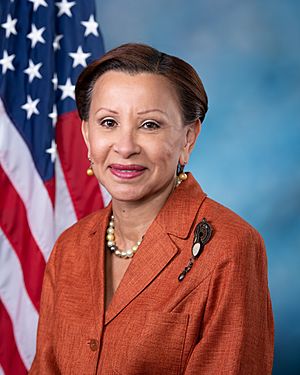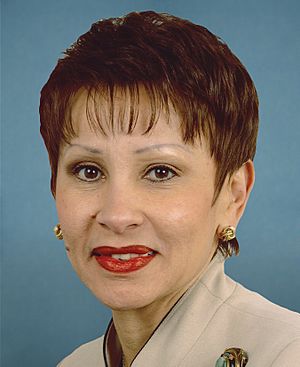Nydia Velázquez facts for kids
Quick facts for kids
Nydia Velázquez
|
|
|---|---|
 |
|
| Ranking Member of the House Small Business Committee | |
| Assumed office January 3, 2023 |
|
| Preceded by | Blaine Luetkemeyer |
| In office January 3, 2011 – January 3, 2019 |
|
| Preceded by | Sam Graves |
| Succeeded by | Steve Chabot |
| In office February 28, 1998 – January 3, 2007 |
|
| Preceded by | John LaFalce |
| Succeeded by | Steve Chabot |
| Chair of the House Small Business Committee | |
| In office January 3, 2019 – January 3, 2023 |
|
| Preceded by | Steve Chabot |
| Succeeded by | Roger Williams |
| In office January 3, 2007 – January 3, 2011 |
|
| Preceded by | Don Manzullo |
| Succeeded by | Sam Graves |
| Member of the U.S. House of Representatives from New York |
|
| Assumed office January 3, 1993 |
|
| Preceded by | Stephen Solarz (Redistricting) |
| Constituency | 12th district (1993–2013) 7th district (2013–present) |
| Member of the New York City Council from the 27th district |
|
| In office 1984–1985 |
|
| Preceded by | Luis Olmedo |
| Succeeded by | Victor L. Robles |
| Personal details | |
| Born |
Nydia Margarita Velázquez
March 28, 1953 Yabucoa, Puerto Rico |
| Political party | Democratic |
| Spouse |
Paul Bader
(m. 2000) |
| Education | University of Puerto Rico, Río Piedras (BA) New York University (MA) |
| Signature |  |
| Website | |
Nydia Margarita Velázquez Serrano (born March 28, 1953) is an American politician and lawyer. She serves as a U.S. representative for New York's 7th congressional district since 2013. She is a member of the Democratic Party. Before 2013, she represented New York's 12th congressional district from 1993. Velázquez was the first Puerto Rican woman to serve in the U.S. Congress.
Contents
Early Life and Education
Velázquez was born in Limones, a town in Yabucoa, Puerto Rico, on March 28, 1953. She grew up in a small house with eight brothers and sisters. Her father worked in sugarcane fields and became a political activist. He even started a local political party. Discussions at their dinner table often focused on the rights of workers.
Nydia went to public schools and skipped three grades because she was a very bright student. She was the first person in her family to finish high school. At 16, she started college at the University of Puerto Rico, Río Piedras. In 1974, she earned a bachelor's degree in political science with high honors and became a teacher.
In 1976, Velázquez earned a master's degree in political science from New York University. She taught political science at the University of Puerto Rico at Humacao from 1976 to 1981. Later, she taught Puerto Rican studies at Hunter College in New York City from 1981 to 1983.
Political Career Beginnings
In 1983, Nydia Velázquez worked as a special assistant for Representative Edolphus Towns. He was a Democrat representing a district in Brooklyn, New York.
In 1984, she was chosen to fill an open seat on the New York City Council. This made her the first Hispanic woman to serve on the council. She ran for election to the council in 1986 but did not win.
From 1986 to 1989, Velázquez was the national director for the Puerto Rico Department of Labor's Migration Division. In 1989, the governor of Puerto Rico named her director of the Department of Puerto Rican Community Affairs in the United States. In this role, she became known for her political skills and her loyalty to other leaders.
Velázquez also started a program called Atrévete Con Tu Voto, which means "Dare with Your Vote." This program helps Latino people in the United States become more involved in politics. It encourages them to register to vote and participate in elections. This project helped Hispanic candidates win elections in many cities.
Supporting Puerto Rico
Velázquez has always been a strong supporter of human and civil rights for the people of Puerto Rico. In the late 1990s and early 2000s, she was a leader in the Vieques movement. This movement aimed to stop the United States military from using the island of Vieques as a bomb testing site.
In May 2000, Velázquez was one of nearly 200 people arrested for refusing to leave the area the military wanted to use for bombing. Her efforts were successful. In May 2003, the military's training facility on Vieques Island was closed. In May 2004, the U.S. Navy's last base in Puerto Rico also closed.
Serving in the U.S. House of Representatives
Elections and Role
Nydia Velázquez first ran for Congress in 1992. She sought a seat in New York's new 12th congressional district, which was created to have a majority of Hispanic residents. She won the Democratic primary election, defeating several other candidates.
In 2012, her district boundaries changed, and she was redistricted into the 7th congressional district. She won the Democratic nomination and continued to serve.
On November 19, 2008, her fellow members in the Congressional Hispanic Caucus chose her to lead their group.
Velázquez has achieved many "firsts" in her career:
- She was the first Hispanic woman to serve on the New York City Council.
- She was the first Puerto Rican woman to serve in Congress.
- She was the first woman to be the top-ranking Democrat on the House Small Business Committee in 1998.
- In January 2007, she became the first woman to chair the United States House Committee on Small Business. She was also the first Hispanic woman to chair a standing committee in the House of Representatives.
In September 2024, Congresswoman Velázquez introduced a federal bill called the "Mel Law." This law aims to guarantee that students who pass away before finishing their studies can still receive their degrees. In April 2024, she was among nearly 20 members of Congress who voted against military aid to Israel.
Committee Work
Nydia Velázquez serves on important committees in the House of Representatives:
- Committee on Financial Services
- Subcommittee on Financial Institutions and Consumer Credit
- Subcommittee on Insurance, Housing and Community Opportunity
- Committee on Small Business (She is the chair of this committee.)
- Select Subcommittee on the Coronavirus Crisis
Groups She Belongs To
Velázquez is also a member of several groups in Congress, called caucuses. These groups focus on specific issues or represent certain communities:
- Black Maternal Health Caucus
- Congressional Hispanic Caucus
- Congressional Progressive Caucus
- Women's Issues Caucus
- Urban Caucus
- House Baltic Caucus
- Congressional Arts Caucus
- Congressional Asian Pacific American Caucus
- Climate Solutions Caucus
- Medicare for All Caucus
- Blue Collar Caucus
- Rare Disease Caucus
- United States–China Working Group
Personal Life
Nydia Velázquez is sometimes called "la luchadora," which means "the fighter." She is Catholic.
See also
 In Spanish: Nydia Velázquez para niños
In Spanish: Nydia Velázquez para niños
- List of Puerto Ricans
- History of women in Puerto Rico
- List of Hispanic and Latino Americans in the United States Congress
- Women in the United States House of Representatives


